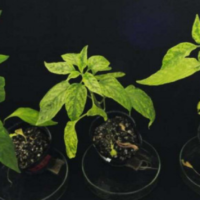Identified Begomovirus Resistance Gene in Pepper Possible solution for global problems: Reduction of damage by plant viruses
For the first time in the world, “begomovirus resistance gene” in pepper was identified by a research group comprised of: Sota Koeda, Associate Professor of Department of Agricultural Science (Graduate School of Agriculture, Kindai University, Nara, Japan), and graduate program research students, Mika Onouchi (1st year), Namiko Mori (2nd year), and Nadya Syafira Pohan (1st year).
With 424 species, the genus begomovirus is a global threat to agricultural production, as many types of vegetable crop including peppers, tomatoes, cucumbers, melons, pumpkins, zucchini, okra, and legumes, can hardly be harvested when infected. In this research, the research team also established a method for identifying begomovirus resistant individuals, and it is expected to reduce the damage in pepper production by developing begomovirus resistant cultivars.
This research was published online in the “Theoretical and Applied Genetics”, an international academic journal for plant genetics and breeding, on June 3rd, 2021.
Key Points
Identified begomovirus resistance gene in pepper for the first time in the world
Developing a DNA marker reliably determines begomovirus resistance, to enable breeding of a virus-resistant cultivar
The research findings may help prevent the damages caused by the virus and excessive insecticide usage which has been a global problem
Overview
In the previous studies, the research group identified the begomovirus species causing damage in Indonesia, where the most serious damage caused by begomovirus was seen (Koeda et al., 2016; Kesumawati et al., 2019), and established a method for assessing the resistance of pepper (Koeda et al., 2018).
Based on these research findings, the research group analyzed the begomovirus resistance of pepper at the genetic level to discover the resistance gene. One causative gene “Pelota” was identified among approximately 30,000 genes. Hypothesized that the mutation of Pelota suppressed viral replication and consequently acquired resistance, the study indicated that suppressing the function of Pelota in ordinary pepper plants, which were vulnerable to the virus, made them more resistant to begomovirus. With these results, it was verified that the Pelota gene mutation causes the pepper to acquire begomovirus resistance.
Comparing the DNA sequences of Pelota between ordinary pepper plants that are vulnerable to begomovirus and resistant pepper plants, one base was changed from adenine (A) to guanine (G).
This mutation was found to be the cause of begomovirus resistance; the research group developed a DNA marker to distinguish the difference of bases to reliably identify begomovirus resistant plants.
About Publication
Journal name: Theoretical and Applied Genetics(Impact factor: 4.439/2019-2020)
Research paper title: A recessive gene pepy-1 encoding Pelota confers resistance to begomovirus isolates of PepYLCIV and PepYLCAV in Capsicum annuum
Authors: Sota Koeda1, Mika Onouchi1, Namiko Mori1, Nadya Syafira Pohan1, Atsushi Nagano2,3, Elly Kesumawati4
Affiliations: 1 Department of Agricultural Science,
Graduate School of Agriculture, Kindai University
2 Institute for Advanced Biosciences, Keio University
3 Faculty of Agriculture, Ryukoku University
4 Faculty of Agriculture, Syiah Kuala University, Indonesia
Location: https://doi.org/10.1007/s00122-021-03870-7
DOI: 10.1007/s00122-021-03870-7




